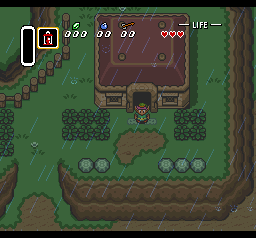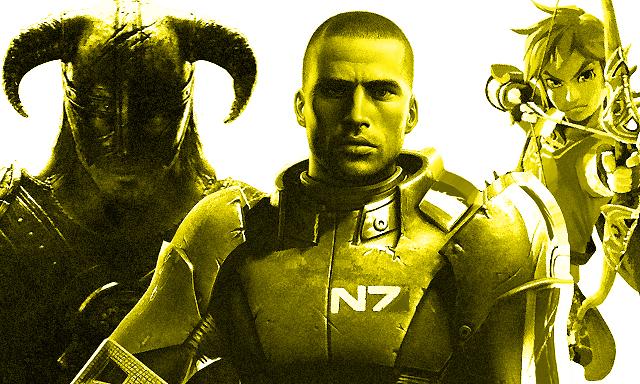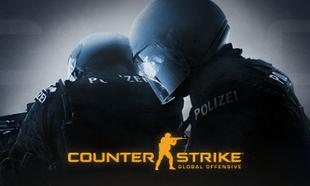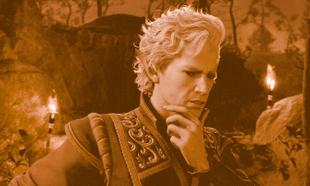Role-playing games, or RPGs, have been around in gaming as long as gaming has been a thing.
From the early days of text-based games like 'Zork' and console games like 'The Legend of Zelda', right up to immersive worlds like 'The Witcher' and 'Skyrim', role-playing games have often been the torchbearer for advancements in gaming technology.
Here's 20 of the best examples.
20. 'Ultima VII: The Black Gate'
Right out of the gate, 'Ultima VII: The Black Gate' is one for purists. First released in 1992 on the PC, pretty much every facet of this game still exists in modern RPGs. Dialogue trees, the 'paper doll' concept of armour on characters, even the idea of moveable objects in the world for no apparent reason was first introduced in 'Ultima VII: The Black Gate'.
19. 'Undertale'
RPGs have been around that long that a game like 'Undertale' was only bound to happen eventually. A game that references both the problematic areas of role-playing game, makes fun of role-playing games, but also respects and understands their allure. It's not for everyone, but 'Undertale' is one of those games that's both hilarious and heartfelt in equal measure.
18. 'Baldur's Gate II'
Out of the criticism against the first game, 'Baldur's Gate II' was a prime example of taking all of that and funneling it into something positive. Even if you never played the first game, 'Baldur's Gate II' had such an innate sense of playability and a richly-designed story that it really did draw you into its world.
17. 'Earthbound'
Like any piece of art, video games can be ahead of their time and 'Earthbound' was just that. The artwork for the game doesn't give away a hint of what's in store for the player, and playing it for the first time makes you wonder how it ever made it out of development. That it's so distinctly against the grain of what was expected of RPGs then - and even now - earns it a place on this list.
16. 'Legend of Zelda: A Link To The Past'
Unless you played the first 'Legend of Zelda' on the NES, this is many people's first introduction to the series and the characters themselves. Thanks to the Classic Mini SNES, you can pick up these games above and below and start playing them with relative ease. 'A Link To The Past' has both the gorgeous music and the ease of gameplay to make you realise why it was such a hit in its time, and why it still is to this day.

15. 'Secret of Mana'
Compared to other JRPGs (that's Japanese Role-Playing Games), 'Secret of Mana' didn't feature a turn-based element to combat, but rather it worked in a similar vein to 'A Link To The Past', with power-bars giving your attacks a bit more oomph. Leaving aside the mechanics, 'Secret of Mana' was a gorgeous-looking game and its bright, candy-coloured imagery belied a dark story about violence, innocence lost, and omens of doom.
14. 'Diablo II'
You could argue 'Diablo II' is more closer to a real-time strategy game, or even a hack-and-slash action game, but the fact is that it also had huge elements of RPG that were too much to ignore. At one point, it was the fastest-selling PC game of all time. Like a lot of Blizzard's output, there's always a certain element of humour to it that just about to bubbles under the surface of all the parent-troubling imagery.
13. 'Chrono Trigger'
There are so many elements of 'Chrono Trigger' that, like 'Ultima VII: The Black Gate', are just taken for granted in today's RPGs. Multiple endings, side-quests related to the plot, even the dialogue guiding to different outcomes - all of that came from the fertile ground of 'Chrono Trigger'.
12. 'Star Wars: Knights of the Old Republic'
'Star Wars' has always been replete with video games and they've crossed all genres, from straight-forward shoot 'em ups like 'Dark Forces' to platformers like 'Bounty Hunter' and 'Super Star Wars' on the SNES. 'Knights of the Old Republic', however, was a far deeper experience than anything offered in these. With the exception of 'X-Wing: Alliance' or 'Jedi Academy', the game was the closest you could get to experiencing a fully fleshed-out 'Star Wars' story at this close range.
11. 'Fable II'
Let's leave aside the controversy surrounding the failed expectations of 'Fable III' and Peter Molyneux's overreaching ambitions with what he could do. If you take 'Fable II' on its own without any of this knowledge, it is a cracking, well-made video game that has an innately open world, full of humour and charm, and offers up easy-to-handle-difficult-to-master combat, and a sensitive appreciation for player's choices.
10. 'World of Warcraft'
When you talk about MMORPGs, you can talk about 'The Old Republic' or 'EverQuest', but the one that everyone knows is 'World of Warcraft'. Let's look at it this way - which MMORPG had a 'South Park' episode dedicated solely to its mechanics? Did 'Runescape' get a major studio to fund a so-so live-action adaptation?
'World of Warcraft' may have lost some of its lustre, but at its zenith, it was a cultural phenomenon and unlike anything anyone had ever seen before. More than anything, 'World of Warcraft' gave birth to the idea of social gaming, something that RPGs - a decidedly singular experience - didn't have.
You had to work together with other people, and that it became so intrinsic to the game, meant it blossomed even further and wider than anyone could have expected. So often, we think of games as being one person, alone in a room trying to figure their way out of a situation. With 'World of Warcraft', it was a world in and of its own making that players could spend hours in, because fellow players were there.
9. 'Elder Scrolls IV: Oblivion'
While its graphics now look decidedly dated, and some of the mechanics were lacking even then, 'Oblivion' has to be considered in context. You'd never before seen a game look this good, and that it was so truly a sandbox adventure - you could pick up and leave the storyline whenever you felt like it - was incredible.
You could spend hours wandering the forests, exploring the ancient ruins and seeking out treasure in them, or you could hack your way across the hills and valleys of Cyrodiil in search of anyone who'd cross you. There was so much in 'Oblivion' that it felt like nothing could top it. That was, of course, until 'Skyrim' came along.
8. 'The Witcher 3: Wild Hunt'
While some might argue that 'Wild Hunt' was more closer to a straight action-adventure game, the fact is that the world in which it exists is quintessentially RPG. It's all high-fantasy horses and swords, and even the range of dialogue options and the way in which it approaches story is so clearly an RPG. Detailed, fluid, and lovingly made, 'The Witcher 3: Wild Hunt' was unique enough to be its own thing, but familiar enough that it was never alien.
The voice-acting, as well as the character graphics, added a real sense of time and place to the world, whilst the combat system and AI were both finely tuned to allow you to really feel like you were on the trail of some horrible creature.
7. 'Pokemon Gold & Silver'
It may be the only Pokemon entry on this list, but let's be clear - it's the only one worth mentioning. 'Pokemon Gold & Silver' helped to turn Pokemon into a billion-dollar gaming franchise because it not only gave players the opportunity to experience the world, but also shape it and make something with it.
The balance between story and action, lore and exploration, all coalesces on the screen and gives it a vitality that hasn't been fully replicated since, not even in recent entries like 'Pokemon: Let's Go!'.
6. 'The Legend of Zelda: Breath of the Wild'
It's hard to overstate just how gorgeous 'The Legend of Zelda: Breath of the Wild' is, and how elegant it is when it comes to gameplay. In the space of less than 20 minutes or so, you're flying high across the plains of Hyrule, swirling up and over, and landing yourself down to do battle with weird monsters.
More than anything, what 'Breath of the Wild' does is allow the player's ingenuity to help complete quests. So many games want you to follow a specific set of instructions, or complete it under a certain time frame, or within parameters clearly marked, in order to advance. It's because the limits of the game can only restrict, but with 'Breath of the Wild', th game wants you to think up of a way to beat its tests.
If you do it the easiest way, so what? That you came to the solution yourself is what's important, and whatever way you solved it - even if it wasn't the cleanest or most elaborate way - isn't important.
5. 'Mass Effect 2'
If 'Mass Effect' was too much of everything, and 'Mass Effect 3' was too simplistic, then 'Mass Effect 2' was just right. There was enough action, story, mystery, and exploration to keep you playing long after the game itself was finished, but what was more intriguing was that 'Mass Effect 2' was by far the most complete version of the franchise.
Everything about it felt so thought-out and considered, and the story itself - traversing the galaxy to build up a team of experts - was perfect, because it gave you a reason to want to explore and find new parts of the galaxy.
Taking the best parts of sci-fi tropes, mixing them together with a 'Dirty Dozen'-style story, 'Mass Effect 2' had all the hallmarks and feel of a prestige television series, and a cast to boot. 'The Handmaid's Tale' star Yvonne Strahovski, Golden Globe-winning actor Martin Sheen as The Illusive Man, numerous actors from 'Battlestar Galactica', there was no denying that 'Mass Effect 2' was detailed and extensive enough in its use of voice-actors to make it all the more immersive.
4. 'Fallout 3'
Given how the first two games were intriguing, if niche explorations of post-apocalyptic RPGs, 'Fallout 3' brought it towards a much more human story. Leave aside the violence and the ghastly horrors of the wasteland, and instead focus on the fact that 'Fallout 3' is just about a child searching for their father, and finding him through his work.
That they had actors of the calibre of Liam Neeson, Malcolm McDowell and Ron Perlman in some of the key roles obviously helped to bring this story to life, but really, 'Fallout 3' did more than just hire the right actors. It brought you into the world, made it your own, and your way of playing it determined how it was experienced. This was something that 'Skyrim' did in much larger ways, but it was something that began here with 'Fallout 3'.
3. 'The Legend of Zelda: Ocarina of Time'
What can be said about 'Ocarina of Time' that hasn't already been said? It's one of those games that people can't remember solving, or even playing through. But it's one that's buried deep in the back of their mind and stays with them. It's always small moments. The first time you find the Great Deku Tree. Being attacked by a ReDead. Learning the Song of Storms or Zelda's Lullaby. Clearing Epona across the fence of the Lon-Lon Ranch.
Whatever that moment is, you can see it as clear as day twenty-one years after you first experienced it. The graphics haven't aged well, nor has the gameplay mechanics. It's simplistic, but in a way that the best art often is.
It has a unique colour, an original sense of storytelling, even in how it introduces the player to the story is not only compelling, but so starkly its own. You're drawn into its world and it immediately ensures that you are a part of it by your choices and actions.
2. 'Final Fantasy VII'
Set aside the gameplay, the graphics, the intrinsic elements of the game itself, and look at 'Final Fantasy VII' and its impact. The game was single-handedly responsible for bringing JRPGs to a massive audience that would have otherwise never played it. It also lifted the PlayStation 1's sales figures and became the highest-selling game of the Final Fantasy franchise. All told, the game has shifted over 11 million units as of 2015. Even Osama Bin Laden had a copy of it.
Trying to parse the story of it wouldn't fit into this already-long article, but suffice to say that 'Final Fantasy VII' had a far more in-depth story than you'd expect for a game on the surface, and dealt with themes and issues that far outstripped anything before or even after it.
Environmentalism, the decaying of life, friendship and betrayal, industrialisation - all of it wrapped up in a complex world and storyline. That a ground-up remake of it some 22 years after its release is now one of the most anticipated games of the year tells you all you need to know about it.
1. 'Elder Scrolls V: Skyrim'
Compared to other games on this list, what 'Skyrim' has over them all is a real sense of time and place to it. It teems with possibility and exploration at every step of the way. You see a mountain, you can go there. You find a forest, you can track across it for hours on end. Whenever you feel like it, you can step back into the main storyline and follow along. When you're done and you feel like doing something else, you can pick up your shield and travel out into the wilderness and the game simply adapts to that choice.
More than any other game on this list, 'Skyrim' and its non-playable characters felt like there was a world there when you weren't. When you returned to it, you could feel the shifts and changes of it and you had to readjust. Beyond that, the size and scope of 'Skyrim' meant that you could play it long after the main storyline finished. If anything, that's when the real game began.
Never has a game so rewarded a player for exploring. You could find anything in the mountains, or dig up some wonderful treasure in a cave. The combat system moulded itself to your style of play. You could become as silent as a whisper, coming up behind an enemy with a knife in your hand or a bow taut and ready - or you could sweep in with a sword and a spell and destroy them in one go. Either option was catered for, and your character could determine that.
That's what 'Skyrim' did better than any of these games. You could transpose yourself into it so easily. If you identified with the Khajit or the Bosmer, so be it. If you wanted to be a powerful Mage, you could. If you preferred to be a swift and silent assassin, 'Skyrim' had the capacity to make it come true. That's what we look for in role-playing games - the idea of fantasy and adventure coming as close to reality as we can.
When you passed through the windy ruins of White Ridge Barrow or climbed the Seven Thousand Steps to the Throat of the World, battling the snow and misty mountains as well as Frost Trolls along the way, it didn't just happen to your character - it happened to you.









































































